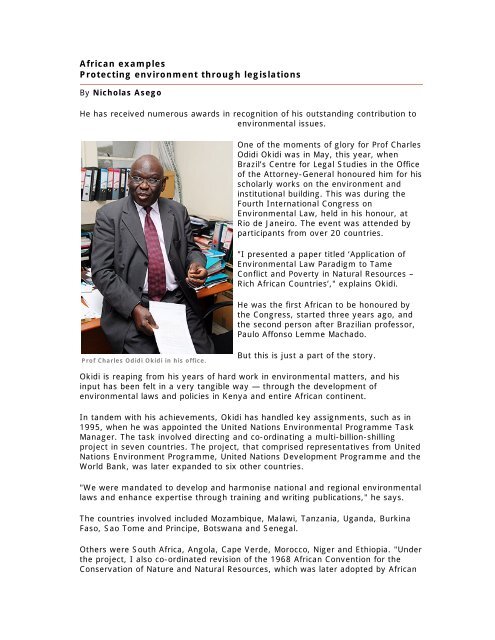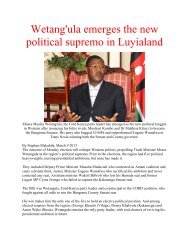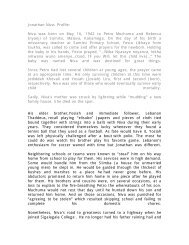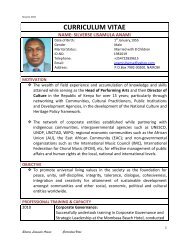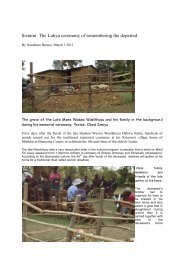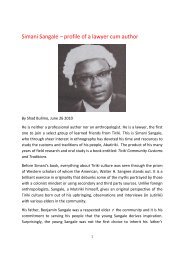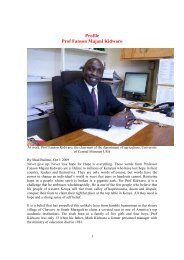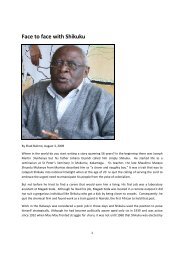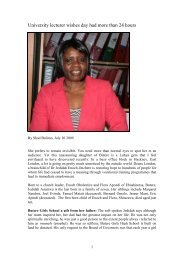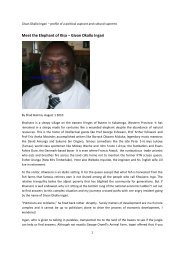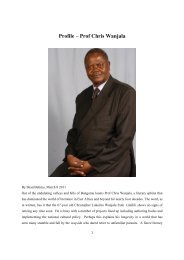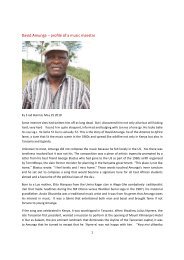Prof Charles Odidi Okidi - Abeingo Community Network
Prof Charles Odidi Okidi - Abeingo Community Network
Prof Charles Odidi Okidi - Abeingo Community Network
Create successful ePaper yourself
Turn your PDF publications into a flip-book with our unique Google optimized e-Paper software.
African examples<br />
Protecting environment through legislations<br />
By Nicholas Asego<br />
He has received numerous awards in recognition of his outstanding contribution to<br />
environmental issues.<br />
<strong>Prof</strong> <strong>Charles</strong> <strong>Odidi</strong> <strong>Okidi</strong> in his office.<br />
One of the moments of glory for <strong>Prof</strong> <strong>Charles</strong><br />
<strong>Odidi</strong> <strong>Okidi</strong> was in May, this year, when<br />
Brazil’s Centre for Legal Studies in the Office<br />
of the Attorney-General honoured him for his<br />
scholarly works on the environment and<br />
institutional building. This was during the<br />
Fourth International Congress on<br />
Environmental Law, held in his honour, at<br />
Rio de Janeiro. The event was attended by<br />
participants from over 20 countries.<br />
"I presented a paper titled ‘Application of<br />
Environmental Law Paradigm to Tame<br />
Conflict and Poverty in Natural Resources –<br />
Rich African Countries’," explains <strong>Okidi</strong>.<br />
He was the first African to be honoured by<br />
the Congress, started three years ago, and<br />
the second person after Brazilian professor,<br />
Paulo Affonso Lemme Machado.<br />
But this is just a part of the story.<br />
<strong>Okidi</strong> is reaping from his years of hard work in environmental matters, and his<br />
input has been felt in a very tangible way — through the development of<br />
environmental laws and policies in Kenya and entire African continent.<br />
In tandem with his achievements, <strong>Okidi</strong> has handled key assignments, such as in<br />
1995, when he was appointed the United Nations Environmental Programme Task<br />
Manager. The task involved directing and co-ordinating a multi-billion-shilling<br />
project in seven countries. The project, that comprised representatives from United<br />
Nations Environment Programme, United Nations Development Programme and the<br />
World Bank, was later expanded to six other countries.<br />
"We were mandated to develop and harmonise national and regional environmental<br />
laws and enhance expertise through training and writing publications," he says.<br />
The countries involved included Mozambique, Malawi, Tanzania, Uganda, Burkina<br />
Faso, Sao Tome and Principe, Botswana and Senegal.<br />
Others were South Africa, Angola, Cape Verde, Morocco, Niger and Ethiopia. "Under<br />
the project, I also co-ordinated revision of the 1968 African Convention for the<br />
Conservation of Nature and Natural Resources, which was later adopted by African
Union summit in July, 2003.<br />
"It was necessary to revise the document to put Africa on the same level with the<br />
rest of the world since many treaties had been signed on protecting the<br />
endangered species and wet lands, among other issues," he explains.<br />
Most eminent environmental policymakers<br />
One would naturally get curious to know how <strong>Odidi</strong> landed the plum job in an<br />
organisation many Kenyans dream of finding their way into.<br />
"They had advertised the job but I did not apply for it. I came to learn that the<br />
organisation was dissatisfied with the numerous resumes it had received. They<br />
headhunted me based on my extensive scholarly works on environmental law, the<br />
fact that I was teaching the subject and also because I had helped establish<br />
programmes on capacity building," he says.<br />
Consequently, <strong>Okidi</strong> got a call one morning from the world body, informing him<br />
that it needed someone to help establish environmental laws in Africa.<br />
<strong>Okidi</strong> says although there are excellent scholarly works on protecting the<br />
environment, translating the same into practice in many countries remains a<br />
challenge.<br />
But he still believes some success has been achieved.<br />
"So far, 36 African countries have<br />
entrenched environmental laws in their<br />
constitutions and another 42 have developed<br />
frameworks to do so," he says.<br />
Nevertheless, <strong>Okidi</strong> says many countries on<br />
the continent are still lagging behind in<br />
implementing the laws, which he attributes<br />
to lack of commitment from political leaders<br />
and inadequate expertise.<br />
Back to his accolades, in 1997, he featured<br />
in a list of the world’s most eminent<br />
environmental policymakers, campaigners,<br />
researchers, authors and academics.<br />
<strong>Prof</strong> <strong>Okidi</strong> (second from right) at a past<br />
function.<br />
The guide, compiled by Nicholas Polunin and Lynn Cunne, is titled, "World Who is<br />
Who and Does What in Environment and Conservation".<br />
During <strong>Okidi</strong>’s stint at Unep, the study he compiled with his team served as a<br />
background for the Eastern African Regional Seas Action Plan and thereafter, the<br />
treaty in 1985.<br />
The scholar also had a stint at the International Court of Environmental Arbitration<br />
and Conciliation, where he was the first African at the institution. The organisation,
that brings together experts from around the world to settle trans-national<br />
disputes, is modelled along the lines of the International Court of Arbitration.<br />
"The task was challenging, and required putting theory into practice, that is,<br />
coming up with practical solutions to public problems."<br />
Common disputes the court handled involved water resources, dam construction,<br />
sea boundaries, oil resources and ocean space. They would also oversee<br />
implementation of environmental impact assessment reports.<br />
"The court’s work is delicate and if it fails to handle some disputes properly, they<br />
can easily degenerate into wars," he says.<br />
Declined educational airlifts to US<br />
So how did this celebrated environment expert start his journey to eminence?<br />
Born in Kamwania village in Kanjira Location, West Karachuonyo, <strong>Okidi</strong> says his<br />
childhood was not a bed of roses.<br />
"I came from a humble background, which made me realise that I had to take<br />
charge of my own destiny without riding on anyone’s back," recalls the 65-year-old<br />
don, who says he abhors shortcuts to prosperity. He demonstrated this early when,<br />
as a student at Maseno High School, he declined an offer of the popular educational<br />
airlifts to the United States of America, initiated by the late Tom Mboya.<br />
"Many students dropped out of primary and secondary school to go to the US. I<br />
had not completed my secondary education, and it was not the culture of Maseno<br />
students to drop out," says the father of two.<br />
Interestingly, <strong>Okidi</strong> found his way to Alaska Methodist University in the US after<br />
being introduced to the institution’s president by a beneficiary of the airlifts<br />
programme.<br />
At the university, he studied Political Science and Social Psychology, before<br />
proceeding to the Fletcher School of International Law and Diplomacy for his<br />
master’s and doctorate degrees.<br />
His impressive academic works started when his thesis, "Legal and Institutional<br />
Arrangements for the Control of Pollution of the Seas", was published into a book in<br />
1978. To date, the book remains a monumental work on marine pollution. His PhD,<br />
which was in public international law and environmental law, was supported by the<br />
University Consortium for World Studies comprising Harvard, Princeton,<br />
Massachusetts Institute of Technology, Colombia and Berkeley.<br />
But his mental bulb for the environment lit up in 1969 while he was in Alaska. "I<br />
disliked the abuse of natural resources and the recklessness private industries<br />
displayed regarding their destructive activities," he says.<br />
One company was constructing the Trans-Alaska Pipeline against a backdrop of<br />
environmental adversity, which prompted a university professor and chairman of
the Alaska Conservation Society to put up a strong campaign against the venture.<br />
The company backed down, which won the professor many admirers, including<br />
<strong>Okidi</strong>.<br />
"I realised that through pressure and appropriate legal channels, the masses could<br />
restrain companies and individuals from destroying the environment," he says.<br />
<strong>Okidi</strong> later became a research fellow at the Massachusetts Institute of Technology<br />
and the Woods Hole Oceanic Institution’s Centre for Marine Policy and Ocean<br />
Management. At MIT, <strong>Okidi</strong> was credited with his study on International Legal<br />
Measures to Control Pollution of the Seas by Oil.<br />
Upon his return to Kenya, he entered the world of academia, rising through the<br />
ranks to a <strong>Prof</strong>essor at the Institute for Development Studies, University of Nairobi.<br />
He introduced environmental law studies at the institution in 1979 before joining<br />
Moi University in 1988, where he helped start the School of Environmental Studies.<br />
"During my tenure as a Dean in the faculty, I helped establish a postgraduate<br />
interdisciplinary programme, offering diploma, Master’s degree and doctorate<br />
courses," he says.<br />
In the course of his teaching, research and training, <strong>Okidi</strong> has mentored many<br />
environmental lawyers and helped sensitise judges and magistrates on<br />
environmental laws.<br />
"The current Chief Justice is very interested in environmental law, and High Court<br />
and Appellate judges have acquired knowledge on the same," says <strong>Okidi</strong>, adding<br />
that this has seen the judicial officers make informed judgements on environmental<br />
cases.<br />
His international awards and honours did not start the other day. In 1984, he was<br />
the first African to receive the Lauriet Elizabeth Haub Prize for Environmental Law,<br />
from Free University in Brussels, Belgium. The award was in collaboration with the<br />
International Council of Environmental Law.<br />
"It was in recognition of my research, published works and participation in<br />
developing environmental policies, laws and administration," says the don.<br />
The award, which came with a gold medal and 150,000 Belgian Francs, is the<br />
highest in environmental law, explains <strong>Odidi</strong>.<br />
More recently in 2003, he was the guest of the Nigerian Conversation Foundation,<br />
where he gave the inaugural lecture at the Chief Shafi Lawal Education Programme.<br />
Later in the same year, he was the J. William Futrell Visiting Scholar at the<br />
Environmental Law Institute, Washington DC.<br />
<strong>Okidi</strong> went back to the university in 2002, which he believes is his first calling. "I<br />
advocate for professors to end their careers at the university. No promotion is<br />
higher than that of a professor," he says.<br />
His main focus now is to help build the capacity of his students to compete at the
international level. "Teaching, researching and guiding students will remain my<br />
focus. A professor is never satisfied until he sees his students do better than<br />
himself," he says.<br />
At the University of Nairobi, he is the founding Director of the Centre for Advanced<br />
Studies in Environmental Law and Policy, where he is also working on its funding.<br />
The Centre offers postgraduate training in environmental law and policy.<br />
The university plans to set up the building on Arboretum Drive. "We want to<br />
establish a library of its kind.<br />
Currently, we have about 10,000 books and monographs," says <strong>Okidi</strong>.<br />
Outside academia, he has been equally active on the environmental front, locally<br />
and regionally. "Between 2001-2005, I was honoured to serve as a board member<br />
of the Kenya Marine and Fisheries Research Institute. In 2003- 2006, I was<br />
appointed Chairman of the Water Institute Governing Council of Kenya."<br />
In all his endeavours, <strong>Okidi</strong> has enjoyed the full support of his family, which he<br />
praises highly. His wife, Doreen <strong>Okidi</strong>, is a businesswoman in Nairobi and the<br />
couple has two children and two grandchildren.<br />
When he is not grappling with matters environmental, <strong>Okidi</strong> is engaged in<br />
development activities in his community. "I am a member of the local Zonal<br />
Parents Teachers Association (PTA), which helps promote education in primary and<br />
secondary schools," he says.<br />
He is also involved in communal economic activities like irrigation and poultry<br />
keeping. "Through small harambees, we have improved water supply and<br />
promoted rural electrification," says <strong>Okidi</strong>.<br />
What is the way forward?<br />
<strong>Okidi</strong> cites some of the current burning environmental issues in the country as land<br />
degradation and pollution, especially in urban centres. "The wanton clearing of<br />
vegetation has destroyed fertile agricultural land and led to soil erosion, whereby<br />
silt has been swept into lakes and rivers, endangering fish and other marine<br />
creatures," he says.<br />
On the recent move by the Government to increase taxation on plastic bags, <strong>Okidi</strong><br />
says it was long overdue.<br />
"We should borrow a leaf from our neighbours in Uganda, who implemented their<br />
environmental laws through the courts," he says adding, "Plastics are a danger to<br />
our environment and livestock. People must be sensitised to re-use the bags rather<br />
than throwing them away."<br />
The don says the way forward for the environment is intense awareness campaigns<br />
directed at individuals and industries on conservation.<br />
"The initiative should be spearheaded by the National Environmental Management
Authority," he adds.<br />
<strong>Okidi</strong> has authored over 31 journal articles, 15 reports of consultancy and expert<br />
studies, and more than 13 books and monographs.


